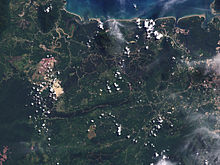- Deforestation in Malaysia
-
Between 1990 and 2005 Malaysia lost 6.6% of its forest cover, or around 1,486,000 hectares.[1]
Contents
Background
Malaysia declared its independence from Britain in 1957, and formed its current state in 1963.[2] Since then, it has seen significant economic growth, a large part of which can be attributed to its forest industry.[3] Malaysia’s rapid rate of development has put it far ahead of several of its neighbors, such as Indonesia and Papua New Guinea. This has largely been in part to its abundance of natural resources, which constitutes significant portions of the country’s economic sector. Because of this large financial gain from logging, production has been high since initiation, and it was not until 1985 that consequences were first realized.[4]
Benefits of logging
As stated above, Malaysia has received considerable financial gain from its logging industry. One statistic states this benefit is valued at $2,150,000,000 USD. Together with neighboring Indonesia, Malaysia produces 85% of the global supply of palm oil, the chief cause of logging.[5] Additionally, the agriculture sector accounts for 14.5% of the labor force - more than 1 in 7 persons.[6] 56.6% of Malaysia’ tropical forests are used for production, leaving the rest for uses such as ‘Protection’ and ‘Conservation’.[7] These statistic clearly show how much both the general population and the Malaysian government is able to benefit from its logging sector, while still leaving untouched nearly half of its abundant forests.
Consequences of logging
Consequences have been varied across different parts of Malaysia.[8] However, all areas have suffered some effect from deforestation. Three of the most prominent include:
- Malaysia ranks as the 21st most biodiverse country in the world, with 2,199 endemic species.[9] 18% of these species are listed as ‘threatened’, and because they are endemic, if Malaysia fails to conserve them, extinction will result.
- Indigenous peoples in Malaysia have always depended on the rainforest for medicine, shelter, food, and other necessities.[10] They are not known to take more that what they need as this would be seen as a transgression of the forest and would bring curses to their people. The destruction of their prime resource is resulting in the destruction of their traditional ways of life. As the forest disappears, so does their culture.
- Runoff has also increased. Though it would not be immediately suspected that logging deep in the jungle could affect a distant city on the coast, because there is less forested area to soak up rainwater and act as a slow-release reservoir, sudden floods are becoming more and more frequent.[11]
- An increased rate of mudslides have been reported.
Conservation efforts
In Malaysia, the World Bank estimates that trees are being cut down at 4 times the sustainable rate.[12] Logging does not have to be as destructive a practice as it currently is in Malaysia. In the past 2 decades, Malaysia has moved towards diversifying its economy, but logging still draws in many because of poor regulation and high profit. The most effect way to combat the negative effects of logging would be tighter regulation that still allows high production of palm oil, but in a more sustainable manner. This way, not only will the effects be mitigated now, but there will be more forests to log, and thus profits to make, in the future.
Malaysia still has a relatively high forest coverage percentage. Currently, it is estimated that 59.9% of the total area is covered by forests,[13] of which, a sizable portion are untouched virgin forests (see old-growth forests) which dates back to around 130 million years.
An increase in the level of awareness of Malaysians compounded with the local folk belief that existed in the indigenous populations (see Semai) has added to the strength of the many Malaysian movements in environmentalism. The Malaysian Nature Society is active in advocating protection of forest. Other organizations such as the Tabung Alam Malaysia, a branch of the World Wide Fund For Nature has also established offices in Malaysia since 1972 dedicated to nature conservation as well as education on the importance of forest conservation to the wider populace. The Forest Research Institute of Malaysia has also been actively conducting research on the biodiversity of Malaysia's forests as well as in conservation.
Current issues
Deforestation in the following areas/project sites have attracted controversy:
- Terengganu:
- Hulu Terengganu Hydroelectric Project
- Pahang:
- Kelau Forest Reserve
- Johor:
- Sungai Mas Forest
- Pulai River Mangrove Forest
- Kelantan:
- Gunung Stong Selatan Forest Reserve
- Perak
- Teluk Rubiah
- Belum-Temenggor
- Selangor:
- Bukit Cherakah
- Kuala Langat
- Sungai Jelok
See also
- Deforestation in Borneo
- Environmental issues in Malaysia
- List of environmental issues
References
- ^ http://rainforests.mongabay.com/deforestation/2000/Malaysia.htm
- ^ <http://countrystudies.us/singapore/10.htm>
- ^ <http://www.monm.edu/cac/students/2007/GP%2007%20Sample%20Essays/Coutts_GP_07.pdf>
- ^ <http://www.monm.edu/cac/students/2007/GP%2007%20Sample%20Essays/Coutts_GP_07.pdf>
- ^ <http://www.perc.org/articles/article1103.php>
- ^ <http://rainforests.mongabay.com/deforestation/2000/Malaysia.htm>
- ^ <http://rainforests.mongabay.com/deforestation/2000/Malaysia.htm>
- ^ http://www.nciv.net/our-issues/timber/more-info
- ^ <http://life.nthu.edu.tw/~d868210/jpg/hwk2/content.html>
- ^ <http://www.tqnyc.org/2005/NYC052139//Asia.htm>
- ^ <http://outskirtoutreach.org/deforestation-malaysian-rainforest-lost/>
- ^ <http://life.nthu.edu.tw/~d868210/jpg/hwk2/content.html>
- ^ http://wwf.org.my/about_wwf/what_we_do/forests_main/
Deforestation by region Africa America Amazon · Argentina · Bolivia · Brazil · Canada · Central America · Colombia · Costa Rica · Guatemala · Haiti · Mexico · Panama · Peru · Venezuela · United StatesAsia Australia and Oceania Europe Categories:- Environmental issues in Malaysia
- Deforestation by region
Wikimedia Foundation. 2010.


